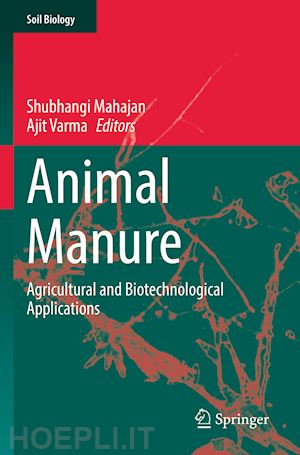
Questo prodotto usufruisce delle SPEDIZIONI GRATIS
selezionando l'opzione Corriere Veloce in fase di ordine.
Pagabile anche con Carta della cultura giovani e del merito, 18App Bonus Cultura e Carta del Docente
This book covers the basics of animal manure, or animal dung, and highlights its applications in agriculture and biotechnology. The reader is given a comprehensive overview of the different types of animal manure. Although animal manure can cause environmental problems, e.g., when slurry pollutes rivers or burnt dung pollutes air, the book emphasizes the fact that animal dung is by no means a waste product. Animal manure is a valuable organic fertilizer that has a positive impact on soil conditions and helps save on chemical fertilizers. It is also a source of energy and can be either be used as fuel or converted into biogas through methanization. Old-age practices such as the use of dried dung as insulating material, or burnt dung as mosquito repellent are also taken up.
With the increasing focus on the UN Sustainable Development Goals (SDGs), this book offers ideas and solutions related to SDG 2 Zero Hunger and SDG 15 Life on Land.
The book will not only be an interesting read for students and researchers in the field of agriculture, but will also appeal to scientists working on waste management, organic manure production or in the paper industry.
Dr. Shubhangi Mahajan completed four years of B.Sc. (H) and two years of M.Sc. with honors in Microbial Technology at Amity University Uttar Pradesh, Noida, India, where she also completed her PhD. During her PhD, she studied the effects of embedded nanomaterial (zinc oxide synthesized at variable temperatures and silica nanoparticle symbiont fungus on black rice). She has also studied the effects of nanomaterials on the shelf life of cut flowers such as roses, lilies, and terrestrial orchids. Dr. Mahajan has published several original research articles in national and international journals with high impact factor. She also has two patents pending.
Dr. Mahajan has received a nationally competitive award "SITARE - Gandhian Young Technological Innovation Appreciation 2020" from the Biotechnology Industry Research Assistance Council of the Department of Biotechnology, Govt. of India. The project dealt with the application of nanomaterial-embedded symbionts on black rice. The award was presented by the Minister of Science and Technology, Govt. of India, Dr. Harsh Wardhan, in the presence of DBT Secretary, Dr. Renu Swaroop, and Dr. Mashelkar, former Director General of CSIR.
Prof. Dr. Ajit Varma is currently the Group Dy. Vice Chancellor, a Distinguished Scientist & Professor of Eminence, Amity Institute of Microbial Technology (Amity University Uttar Pradesh) & Vice Chairman, Amity Science, Technology & Innovation Foundation, Amity Campus, Noida, Uttar Pradesh, India. He was a visiting professor to many internationally reputed Universities. He has received more than 100 awards from several notable scientific bodies such as Commonwealth Fellowship (Australia), National Research Council (Canada), Alexander von-Humboldt Foundation (Germany), National Science Foundation (USA), Swiss Federal Research Fellowship (Switzerland), BP Koirala award (Nepal), DFG-INSA Fellowship (Indo-Germany), FAMI Award 2011 (India)and many more.
He has successful supervised over 109 Ph.D students and one D.Sc student. He has published over 450 research articles, which appeared in National and International, journals of repute and also several major review articles and chapters in books, published 114 books in the area of Microbial Technology, published by Academic Press, London, CRC Press, Florida, USA, IDRC, Canada and Springer-Verlag, Germany. Nominated as Editor-in-Chief by Springer-Verlag (Germany & New York), the leading science-publishing house, to prepare volumes on Soil Biology. Nominated as Editor-in-Chief by IK Internationals to make series of books on Microbial and Biotechnological Research, Academic Editor - ‘International Journal of Plant & Soil Science.











Il sito utilizza cookie ed altri strumenti di tracciamento che raccolgono informazioni dal dispositivo dell’utente. Oltre ai cookie tecnici ed analitici aggregati, strettamente necessari per il funzionamento di questo sito web, previo consenso dell’utente possono essere installati cookie di profilazione e marketing e cookie dei social media. Cliccando su “Accetto tutti i cookie” saranno attivate tutte le categorie di cookie. Per accettare solo deterninate categorie di cookie, cliccare invece su “Impostazioni cookie”. Chiudendo il banner o continuando a navigare saranno installati solo cookie tecnici. Per maggiori dettagli, consultare la Cookie Policy.